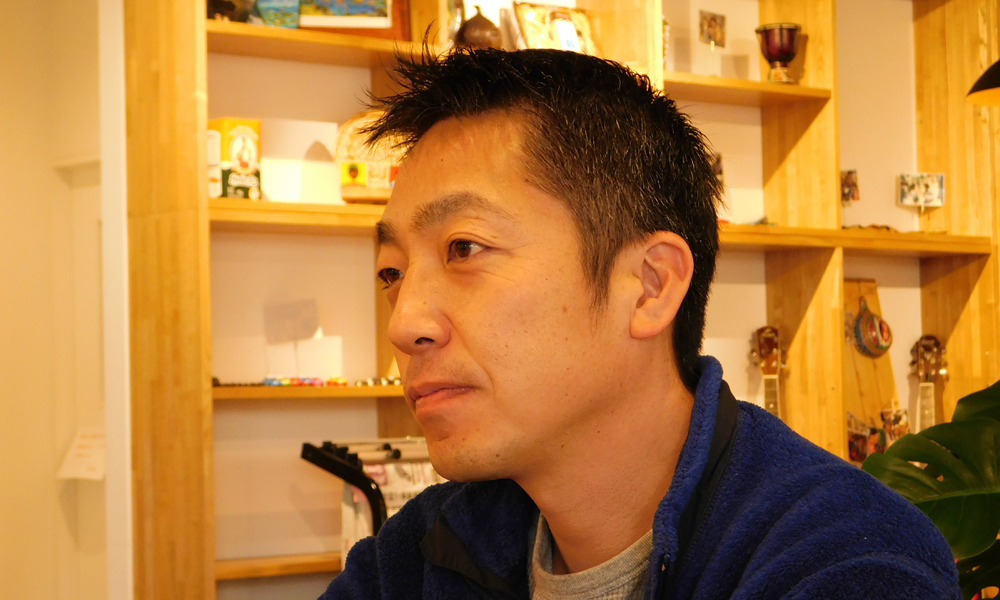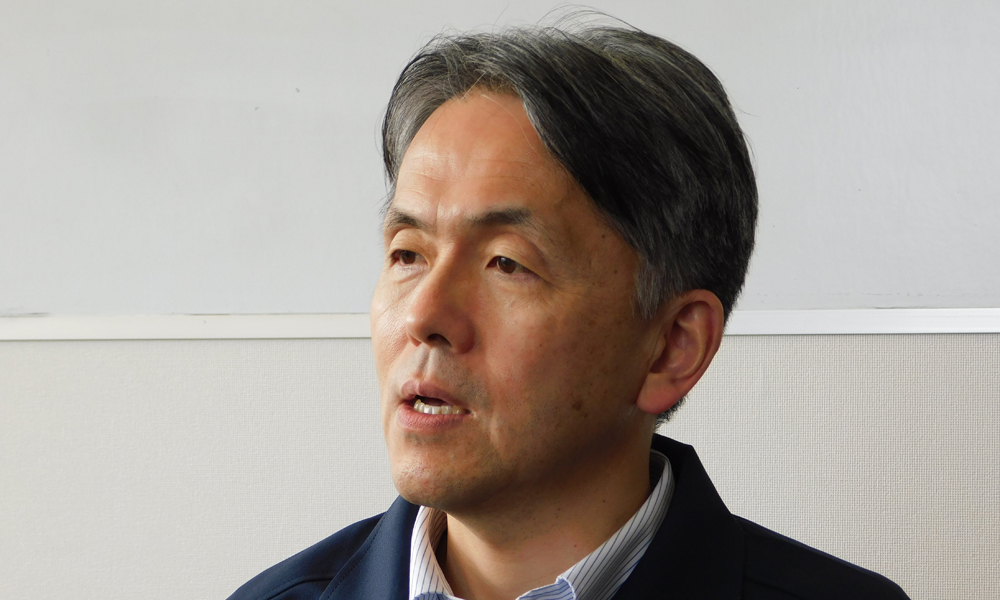Work Within Communities, Not Buildings

Japan Overseas Cooperative Association
Mr. Horita Naoki, Director and Secretary General
Komagane CityThe upbeat Mr. Horita Naoki speaks enthusiastically about how he decided to relocate the headquarters of the Japan Overseas Cooperation Association (JOCA) from Tokyo’s Chiyoda Ward to Nagano’s Komagane City in 2018. By relocating from the Metropolis’ bustling concrete jungle to a cozy corner in Komagane’s shopping district, he says, the organization has developed a strong bond with the local community, which has helped expand their opportunities. Here he shares with us how and why JOCA chose Komagane as its new home.
■ What is the Japan Overseas Cooperation Association (JOCA)?
JOCA is a public interest incorporated association organized by former members of Japan Overseas Cooperation Volunteers (JOCV). The organization is responsible for part of the Japan International Cooperation Agency (JICA)’s activities, with the goal of putting volunteers’ experiences to practical use in a variety of fields.

Details leading up to entry to Nagano Prefecture
JOCA’s primary objective is to put the valuable experiences we gained through our activities abroad to practical use inside as well as outside the country. Though in practice, our activities had tended to be directed outward, reflecting our general mindset. If you think about it, overseas cooperation cannot be sustained without support from the domestic public.
I realized there had been fewer and fewer young applicants for JICA’s overseas cooperation volunteer program, and had even heard critical comments during program reviews. What all this pointed to was that, in Japan, JICA’s objectives and activities were not as well known or appreciated as they should be. This prompted me to look inward. I thought, we should be devoting our energy not only overseas but also toward domestic and local issues.
Looking back, in those days, our headquarters was centered in the middle of a building in Chiyoda Ward, the heart of Tokyo. Words like “regional” or “local” rang hollow, since we had no contact with real local residents.
We started realizing how empty, or even hypocritical if you will, it was to be using phrases like that while working there, and began to seriously consider moving our headquarters somewhere else.
- JOCA’s motivation for relocation was to find a place more suited to their activities and goals, where they could embody their mission to the fullest.

Reason for considering entry to Nagano Prefecture
Currently JOCA has two training centers: one in Komagane, Nagano and the other in Nihonmatsu, Fukushima.
Thanks to the cooperation of the local communities, JOCA was already very well known in those two cities. We could easily identify ourselves as being with JOCA and be recognized.
So we found Komagane and Nihonmatsu to be the best places for building bonds with local people. They were natural choices for our new headquarters.
In fact, Komagane was already embracing an ambassador village project (“construction of a truly international town”) as part of its overall urban planning strategy. This program was very compatible with the main objective of our relocation, which was to build up a local community. So, Komagane would be a good environment for JOCA to offer its cooperation, we thought.
The idea was JOCA working alongside local people to build up a robust community, establishing a presence while also taking a back seat. This ideal could be realized here, we felt. That’s why we finally chose Komagane.
-Komagane had also long been a recipient of wholesale support from Junior Chamber International Japan, and been participating in various international cooperation programs as part of its overall strategy. So, there was already a fairly strong bond, according to Mr. Horita.

Results of entering Nagano Prefecture
Today, we enjoy strong support from the local people, as well as a forward-looking atmosphere. JOCA and Komagane citizens are eager to work together to encourage growth in the town by creating new activities. So I believe things are going along the way we intended in the beginning.
If we had stayed in Tokyo, we would not have succeeded in establishing this kind of favorable relationship with local people. Only by relocating to Komagane have we accomplished so much together with its residents, and we see our frontier of work expanding.
Frankly, it did not do any harm to transport all our work in Tokyo to this city. Not only that, it’s great that we have been able to open new frontiers without shedding anything we had there.
-When JOCA’s headquarters were located in Tokyo, Mr. Horita used to spend one and a half hours each way commuting from Chiba. Now in Komagane, it takes him only about 5 minutes to come to the office. This means a great saving (nearly 3 hours a day) in commute time, which he can put to more constructive use.

How do you evaluate Komagane as a business location, in comparison with big cities, in terms of building a hub for dealing with overseas organizations?
Well, there is no immediate need to focus on international connections, if you ask me. Also, being in Tokyo does not necessarily mean you are closer to the international world.
Rather, I find greater value in being here, connected with the people we wanted to be connected with.
True, it’s a little farther to go from here to Narita to meet the people with whom we deal, but again, we don’t need to go there every day. Please note that we still have an office in Tokyo. So we don’t see it as any kind of disadvantage. In fact, we see many more advantages than disadvantages.

Please tell us more about communication and cooperation with the local people.
First of all, JOCA is basically a grassroots organization. That means we go overseas, live with local people, eat the same food as local people, and do everything together with local people.
That’s a sharp contrast with what an elite consultant would do, staying in a high-rise building and arguing, “This is the way a shopping district should be.” How on earth can that work?
We always wanted to go to places where we can all be in the same place and where we can be connected with others.
So, one day we were walking along this shopping street, found the Citizen Life Support Center building, and asked the city officer, “Would it be possible to let us use this office?”
Be a part of the shopping district, be a part of the local community, take up the same burden as its members, and move forward together sharing the same responsibility. That’s the most important thing, I believe.
This way, without us saying anything, our name starts coming up in various places, with people asking, “What is JOCA?,” “Who are cooperation volunteers?,” and so forth.
By working together with the local community, JOCA can contribute to its progress, and at the same time, our activities will take root in it, won’t they?

We hear that you are also being backed up by the public administration.
Actually, it’s not that we were invited, but it’s the other way round; we approached the city office asking for permission to move in. At first the city officers were quite surprised, but then were kind enough to welcome us and to give us various support we needed.
For example, they bore the cost of repairing the frame of the building and helped incoming staff of ours find places to live. They even went out of the way to organize a house-hunting tour. We were very grateful for their kindness.
We were also lucky enough to take advantage of a grant from the Nagano Prefectural Government for relocating headquarters.
- JOCA’s office is also featured as a model example of the “Shinshu Resort Telework” program.

Finally, do you have any message to companies and other organizations considering relocating to Nagano Prefecture?
One of the advantages of relocating to a local region such as Nagano is that you will not get “buried.”
In Tokyo, even a reasonably excellent company may get buried. For example, if you are not well known, you have a hard time landing contracts or recruiting good staff.
To use us as an example, the name JOCA is well known in Komagane today, which goes a long way in getting and establishing a connection. This fact alone has helped us to expand our operational opportunities more than in Tokyo.
Today, thanks to online business tools such as Zoom, there are fewer and fewer things that you cannot do without sitting face-to-face with the customer in Tokyo.
For those companies and organizations not so much affected by such barriers, I personally suggest that they relocate to Nagano Prefecture like we did, especially to the shopping district in Komagane.
-Relocating to a local region helps you stand out and avoid being buried as “just one of many” in Tokyo. It helps establish strong ties with local companies and local people, which in turn helps you to expand your business chances.



